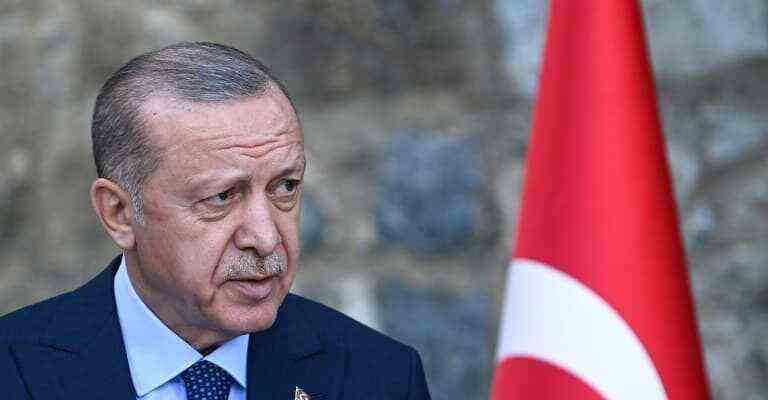The Turkish president accuses the ambassadors in question of having demanded the release of the opponent Osman Kavala. He believes that they “must know and understand Turkey”.
Turkish President Recep Tayyip Erdogan announced on Saturday that he had ordered the expulsion “as quickly as possible” of the ten ambassadors including those from France, Germany and the United States, who demanded the release of the opponent Osman Kavala.
“I ordered our Foreign Minister to declare these ten ambassadors persona non grata as quickly as possible,” said the head of state during a trip to central Turkey, without specifying the date on which diplomats will have to leave.
These diplomats “must know and understand Turkey”, continued Recep Tayyip Erdogan, accusing them of “indecency”. “They will have to leave ‘the country’ if they no longer know it,” he added. A rare measure in international relations, declaring diplomats “persona non grata” opens the way for their expulsion or recall by their own country.
No official notification at this stage
According to a German diplomatic source, the ten countries concerned were consulting on Saturday evening, without having received official notification of the measure.
“From morning to night they (the diplomats) repeat: Kavala, Kavala … But the one you are talking about, Kavala, is Soros’ agent in Turkey,” President Erdogan said during a public meeting, making a statement. again reference to the American billionaire of Hungarian origin George Soros to whom he regularly compares the opponent.
Imprisoned for four years without trial, Osman Kavala has been accused since 2013 by President Erdogan’s regime of wanting to destabilize Turkey.
In a press release published on Monday evening, Canada, France, Finland, Denmark, Germany, the Netherlands, New Zealand, Norway, Sweden and the US called for a “fair and speedy settlement” Osman Kavala, Turkish businessman and patron who has become one of the regime’s pet peeves, has been imprisoned for four years without trial.
The next day, their ambassadors were summoned to the Foreign Ministry, the Turkish authorities deeming their approach “unacceptable”. The Turkish head of state then brandished the threat of deportation on his return from an African tour on Thursday.
“Nothing that can justify the expulsion”
Among the first countries to react, on Saturday evening, Sweden, Norway, Denmark and the Netherlands as well as Germany announced that they had not received any official notification concerning their respective ambassadors at this stage.
“Our ambassador did nothing that could justify the expulsion,” Norwegian Foreign Ministry spokeswoman Trude Måseide said, quoted by NTB news agency, adding that her country “will continue to urge Turkey to adhere to democratic standards “.
“We are currently in intensive consultation with the other nine countries concerned,” for its part announced the German Foreign Ministry. Several Dutch parliamentarians also reacted on social networks.
“Rightly, the Dutch ambassador to Turkey has, among other things, called for the implementation of the judgments of the European Court of Human Rights. From now on, the 27 EU countries must join this,” tweeted Labor MP Kati Piri.
In December 2019, the European Court of Human Rights (ECHR) ordered the “immediate release” of Osman Kavalan, to no avail.
At 64 years old, this major figure of civil society, wealthy businessman and philanthropist, born in Paris, was kept in detention at the beginning of October by an Istanbul court which considered “lacking new elements to bring him back into custody. freedom”. Osman Kavala, who has always denied the charges against him, will appear again on November 26.
Originally arrested for his participation in the so-called Gezi anti-government movement in 2013, when Recep Tayyip Erdogan was prime minister, he was subsequently charged with attempted coup d’etat and espionage.
“A fair trial is no longer possible”
In a recent interview, Osman Kavala said his detention allows Erdogan’s regime to justify its “conspiracy theses”.
“Considering that a fair trial is no longer possible in these circumstances, I think that it makes no sense for me to attend the hearings to come”, he announced Friday via his lawyers.
The Council of Europe recently threatened Turkey with sanctions, which could be adopted at its next session (November 30 to December 2) if the opponent is not released by then. Opposition leader Kemal Kiliçdaroglu estimated that the threat of an imminent expulsion of the ambassadors risked “plunging the country into the abyss”.

